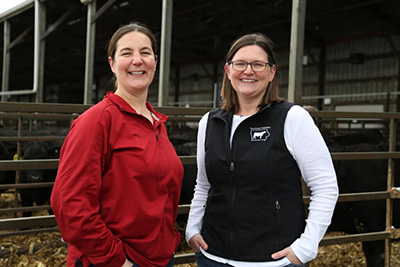
Dr. Jodi McGill, the John G. Salsbury Endowed Chair in Veterinary Medicine and assistant dean for research and graduate studies, has been awarded a $50,000 Presidential Interdisciplinary Research (PIRS) Seed Grant. McGill and Dr. Stephanie Hansen, professor of feedlot nutrition, will collaborate to study the use of feedlot cattle as a model for human metabolic dysfunction and obesity. Established in 2017, the PIRS program is administered by the OVPR and supported with funds from the Office of the President and an endowment from the Mary G. Miller estate. The annual award is given to support university faculty members pursuing initiatives that are innovative, high-risk, and high reward, with an interdisciplinary focus and strong potential for external funding.
Obesity represents a rapidly expanding human health crisis globally, specifically due to the relationship between obesity and metabolic dysfunctions – with insulin resistance as a common resulting disorder. Within the U.S., the rising prevalence of diet-related diseases, such as type 2 diabetes, obesity, and hypertension, has been cited as a “health crisis” by the Biden-Harris Administration. But despite the growing awareness and concern linked to metabolic diseases, when it comes to addressing the science behind the upward trend in prevalence, current animal models for obesity and related pathologies have significant limitations. Most notably, in terms of being able to translate animal data into findings helpful in the treatment of human conditions.
Together, McGill and Hansen hope to address these limitations by laying the groundwork for using Iowa’s feedlot cattle industry as a new model for human metabolic dysfunction and obesity, in their PIRS project entitled, “Exploring Potential of Obese Feedlot Cattle as a Model for Diabetes in Humans.”
Built on similar physiological responses to high-calorie diets and low exercise shared by both humans and feedlot cattle, McGill and Hansen plan to investigate the relationship between body fat, inflammation, and metabolic changes as cattle progress from the growing to finishing stages of beef production. Because a growing body of evidence also suggests that feedlot cattle can experience declining insulin sensitivity – just as humans do when developing diabetes – the project will also include assessments of insulin sensitivity in cattle with a variety of obesity levels.
By exploring the interplay between body fat, inflammatory responses, and metabolic syndrome changes in a naturally occurring obesity model via feedlot cattle, McGill and Hansen’s PIRS initiative will attempt to fill a critical gap in traditional models, which often fail to accurately reflect human metabolic processes due to their differing lifespans, metabolisms, and sizes. Findings related to these dynamics hold the potential to inform future therapeutic interventions for a variety of human metabolic diseases.
“My passion is the immune system and how it works, and most of my expertise is in infectious diseases, making this project a pivot for looking at the immune system in a completely new context,” McGill said. “But I love a new challenge and this project is building the foundation for future collaborative work in this area. By leveraging our combined experience in large-animal models and immunometabolic processes, we hope to unlock a new avenue that has remained largely unexplored.”
In addition to the potential human health impacts of the research project, attention will be paid to the impacts of obesity on the beef production industry, in which there is a delicate balance between consumer-preferred marbling scores and incentive for an animal to reach a higher body weight for greater economic return. By evaluating the progression of metabolic dysfunction as cattle increase in weight and body fat percentages, data will be collected related to cattle metabolism and efficiency of nutrient use.
“The translational potential of this research is significant, as it can inform both practices for managing cattle health and growth and offer groundbreaking perspectives in human medical interventions,” Hansen said. “I am really excited to study these late-stage finishing cattle and determine if we can continue to improve efficiency of feed conversion to beef, which would mean fewer resources needed for every pound of beef we produce and greater profitability for stakeholders in the state.”
February 2024
